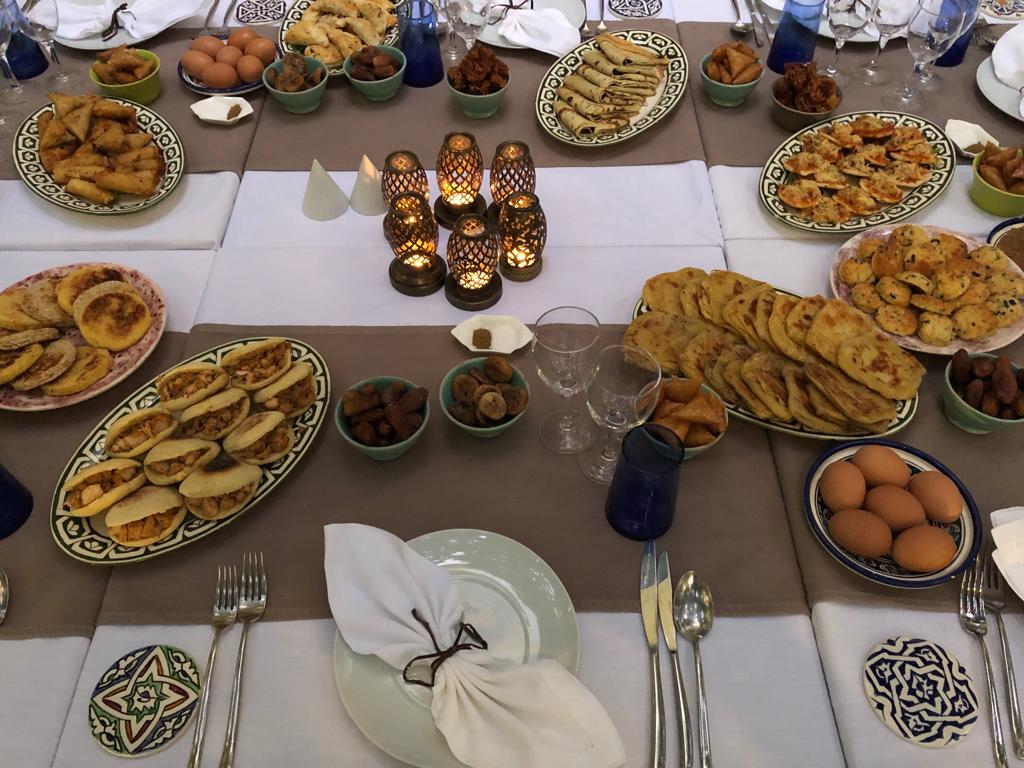Ramadan Rituals in Morocco
The month of Ramadan is the month of spirituality, prayer, charity, and abstention from eating and drinking from sunrise to sunset. The spirituality of the holy month also carries with it elements of Moroccan tradition dating centuries. A unique and essential time of the year when people are eager to openly celebrate traditions with their families and loved ones.
Ramadan Rituals:
During the month of Ramadan, Muslims don’t eat or drink or smoke during daylight hours. Through fasting, Muslims restart their awareness of and gratitude for everything God has provided in their lives. There are two essential meals eaten at a specific time. Muslims have one meal before dawn, the “predawn meal” or “the Shur”, and another after sunset, called the “iftar” or Ramadan breakfast. At the center of Ramadan there are spiritual things – praying more, helping the poor, thinking over one’s life and, of course, getting closer to God.
Moroccan people are known to be very fond of their own traditions. They celebrate their religious occasions in their own way. In the very Moroccan philosophy, the holy month is a turning point for your spirit to be purified. It is an appropriate time to share what you have with the needy and the poor.
And then, there is Taraweeh prayers. Even though they are non-compulsory, yet strongly recommended. Ramadan would not be complete without crowds of men in traditional white praying clothing walking to the overflowing mosques with their prayer mats on their shoulders.
The Moroccan Food Culture During the month of Ramadan:
Most Muslim cultures focus on food during Ramadan, and especially the evening meal iftar is a big celebration for everyone. As the sunset approaches, people sit down in front of their food plates and enduring the smell; patiently wait for the prayers announcing the end of the day of Ramadan. Each day, when the sunsets after the fourth prayer, families join together to celebrate their first meal of the day, the Iftar, Moroccan breakfast.

Iftar is more commonly called ftour, the same word used for breakfast. Dates, milk, juices, and sweets typically provide the sugar surge needed after a day of going without food. The smell of Harira Soup is definitely a must on the Iftar table, the hard-boiled eggs, sweet or savory-filled pastries, fried fish, and various pancakes and flatbreads might also be served.
Large batches of sweets such as sellou and chebekia are also traditionally prepared in advance for use throughout the month as are cookies and other pastries. These and other Ramadan recipes can be made all year round, but they are especially popular during this holy month.
Travel During the month of Ramadan:
Ramadan in Morocco is a unique experience for travelers. For many, this time of year is frightening, as the normal rhythm of life in Morocco stops. But after finding out more about Ramadan, travel at that time can become a special holiday.
Our restaurant Eden offers a delicious Iftar Menu (Ftour Menu). It is the perfect occasion to join our staff in breaking their fast whether you are doing Ramadan or not. Come as a family, come as a group of friends and share some delicious food.
Ramadan Kareem!
Loubna El Bouchikhi,
Experience Coordinator at The Palais Amani


